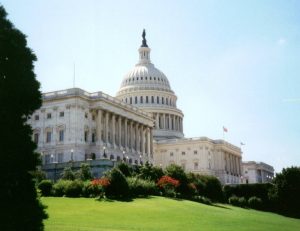 NYSSSWA is an affiliate state organization of the School Social Work Association of America. We have lobbyists who represent us in Washington D.C. and they help to keep us updated on bills that have an impact on school social work services. If you are not already a SSWAA member supporting our profession on the national level, join today! (NYSSSWA members get $25 discount off of an event or item.)
NYSSSWA is an affiliate state organization of the School Social Work Association of America. We have lobbyists who represent us in Washington D.C. and they help to keep us updated on bills that have an impact on school social work services. If you are not already a SSWAA member supporting our profession on the national level, join today! (NYSSSWA members get $25 discount off of an event or item.)
National News
Federal Legislation:
- See SSWAA’s Legislative News & Advocacy webpage.
- Fact Sheet: Biden-Harris Administration Announces Two New Actions to Address Youth Mental Health Crisis. Source: July, 2022. U.S. Department of Education.
- How to Improve Mental Health in Schools and Why It Matters Support for Senate Bill 1122. Ott, E. & Sierra, A. 12/2/2020. SSWAA
- School Social Work “More Important Now Than Ever Before” by Ami Flammini 11/19/2020. SSWAA.
- SSWAA Calls for End to Family Separation Policy at the Border June 22, 2018. SSWAA.
- “13 Reasons Why” SSWAA’s Response Statement May 9, 2017
- SSWAA’s Statement on Executive Order on Immigration February 9, 2017 SSWAA’s Letter of Response to National Divisions.
- SSWAA Response–Creating a Positive Climate in Schools November 16, 2016. SSWAA
 Websites to “Take Action”
Websites to “Take Action”
- How to find your U.S. Representative.
- How to find your U.S. Senator
- How to contact or write your U.S. Senator.
- Frequently Asked Questions in writing your U.S. Representative.
In September 2019 NYSSSWA’s President, Peg Barrett met with Congressman Brian Higgins to advocate for increased mental health services in schools. Let us know of your advocacy efforts.
Advocacy Resources
- Advocating for Social Workers In: Aging, Behavioral Health, Child Welfare, Clinical Social Work, Health Care, School Social Work Source: 2019. National Association of Social Workers.
- Bazelon Center for Mental Health Law. The Bazelon Center pursues a progressive mental health policy agenda, particularly at the federal level, to reform systems and programs to protect the rights of children and adults with mental disabilities to lead lives with dignity in the community.
- Congress.gov “Congress.gov is the official website for U.S. federal legislative information. The site provides access to accurate, timely, and complete legislative information for Members of Congress, legislative agencies, and the public. It is presented by the Library of Congress (LOC) using data from the Office of the Clerk of the U.S. House of Representatives, the Office of the Secretary of the Senate, the Government Publishing Office, Congressional Budget Office, and the LOC’s Congressional Research Service.”
- Create a petition to the White House. Click here
- How to Get Publicity for School Social Work Media tips written by Mary Bragg, Past President of the Illinois Association of School Social Workers. Used with permission.
 Macro Level Advocacy Toolkit “This toolkit will provide tools to increase your knowledge about how to be an effective advocate for the children and families you serve as well as how to promote the role, expertise, and value that school social workers bring to the educational team. Each module provides the components to develop a strategic plan around macro-level advocacy for state associations or leadership teams.” Source: SSWAA
Macro Level Advocacy Toolkit “This toolkit will provide tools to increase your knowledge about how to be an effective advocate for the children and families you serve as well as how to promote the role, expertise, and value that school social workers bring to the educational team. Each module provides the components to develop a strategic plan around macro-level advocacy for state associations or leadership teams.” Source: SSWAA - The National Conference of State Legislatures is a bipartisan organization that serves the legislators and staffs of the nation’s 50 states, its commonwealths and territories. NCSL provides research, technical assistance and opportunities for policymakers to exchange ideas on the most pressing state issues.
- The Legislative Process: Can I Get That Grant Today? and other questions with not-so-simple answers Written by Libby Nealis and publicly available on the SSWAA website.
- Talking Points for SSW Bill
- THOMAS: “Congressional Legislation Resource: January of 1995, the leadership of the 104th Congress directed the Library of Congress to make federal legislative information freely available to the public. Since that time THOMAS has expanded the scope of its offerings to include: Bills, Resolutions, Activity in Congress, Congressional Record, Schedules, Calendars, Committee Information, Presidential, Nominations, Treaties, Government Resources, and Resources For Teachers”
For additional information on legislation at the federal level, please go to SSWAA’s Legislative News & Advocacy webpage.
School Social Workers as Specialized Instructional Support Personnel (SISP) WHAT DOES THIS MEAN?
The following definitions outline the role of SISP:
- The National Education Association defines SISP’s as: “As defined in the Every Student Succeeds Act (2015), the term ‘specialized instructional support personnel’ means: “school counselors, school social workers, and school psychologists; and other qualified professional personnel, such as school nurses, speech language pathologists, and school librarians, involved in providing assessment, diagnosis, counseling, educational, therapeutic, and other necessary services (including related services as that term is defined in section 602 of the Individuals with Disabilities Education Act (20 U.S.C. 1401) as part of a comprehensive program to meet student needs.’”
- The National Alliance of Specialized Instructional Support Personnel defines SISP as: One of our key recommendations was to “Clarify conflicting terminology, definitions, and roles of pupil/related services personnel to adopt one single term — “specialized instructional support personnel”— that will be used in all education laws that reference these personnel. NASISP is pleased that ESSA defines and references Specialized Instructional Support Personnel (SISP) throughout the statute, reaffirming the important interventions and services that SISP provide our students, many of whom come to school with the most severe academic, health, and social-emotional barriers to learning. Importantly, the ESSA explicitly requires consultation with SISP in the development of Title I State and local education agency plans, as well as Title IV plans and needs assessments. SISP are further included in the development of school-wide programs, targeted assistance, and integrated student supports within the school and coordinated with the community.
The History of the National Alliance of Specialized Instructional Support Personnel
Specialized Instructional Support Service Descriptions Roles as defined by the National Alliance of Specialized Instructional Support Personnel
ESSA and School Social Work
Myrna Mandlawitz, Former SSWAA Director of Government Relations
“SISP, including SSW, are found in many places in ESSA. Most important, they must be at the table in the development of state and local Title I plans. They are also included in professional development and consulted on a range of issues.
School social workers are part of the definition of “school-based mental health providers.” That means anywhere that mental health services are an allowable use provides an opening for school social workers. With the elimination of the Elementary and Secondary School Counseling competitive grant program, school social workers will have to look elsewhere in the law to fund positions and to get the profession recognized.
Myrna and Dot Kontak, NYSSSWA Director of Communications & Membership Services, prepared Every Student Succeeds Act of 2015 (ESSA): School Social Work, Specialized Instructional Support Personnel, and School-Based Mental Health Services to assist school social workers as they advocate in their own states and school districts to maintain and increase SSW services. SSW services are competing with a lot of other “allowable uses” of funds, so advocacy is more important than ever. We hope this new tool will help distill the complex law down to what you need to make your case for school social work services.”
Photo: Used with permission from Dot Kontak

